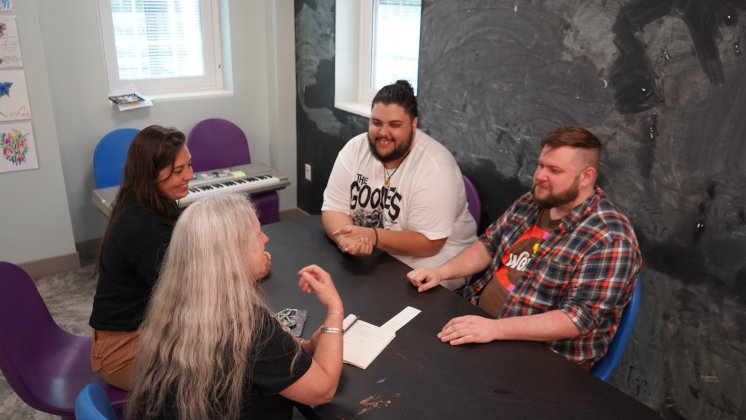
Brattleboro Retreat Honored for Excellence in Communication and Education
by Mary Wilson // June 5, 2025
Read More
Brattleboro Retreat Welcomes Christine Alvarez as New Vice President of Outpatient and Residential Services
by Mary Wilson // May 8, 2025
Read More

The Healing Power of Creative Arts in Mental Health
by Rory Tallon-Hicks // April 29, 2025
Read More


Brattleboro Retreat Names Steve Cummings as Chief Executive Officer
by Mary Wilson // November 1, 2024
The Brattleboro Retreat is pleased to announce that its Board of Trustees has voted to appoint Steve Cummings as Chief Executive Officer, following his tenure as Interim CEO since April 2024.
Read More
Building on Momentum: Steve Cummings named Interim CEO at Brattleboro Retreat
by Mary Wilson // June 21, 2024
The Brattleboro Retreat is pleased to announce that its Board of Trustees has voted to appoint Steve Cummings as Chief Executive Officer, following his tenure as Interim CEO since April 2024.
Read More
Navigating the complexities of eating disorders
by Mary Iellamo, M.Ed. // June 20, 2024
The term “eating disorder” conjures different images for different people. Perhaps one imagines the stereotypical middle-class adolescent girl restricting her food intake to change the way her body looks.
Read More
Ambiguous loss: Working through it despite no clear resolution
by Jilisa Snyder // June 20, 2024
I began my health care profession as a physical therapist working in acute rehabilitation. Daily, I bore witness to and interacted with those living in the midst of traumatic bodily injury.
Read More
Harmonious Healing
by Daniel Lang, MOT, OTR/L // January 3, 2024
Meet a music therapist at the Brattleboro Retreat.
Read More
Take a breath for mental health
by Timothy Kanczuga, MSN, RN, FNP-BC // December 4, 2023
Breathing is essential for life, but it is also a powerful tool for mental health.
Read More
How do you heal a 'soul wound?' Reflections on Indigenous People’s Day and mental health
by Nnamdi Pole // November 29, 2023
This week marked Indigenous People’s Day, a day that is meant to celebrate the approximately 7 million American Indian, Alaska Native, and Native Hawaiian survivors of ancestors who originally inhabited these lands before they were colonized by European settlers.
Read More
Our youth mental health crisis
by Karl Jeffries, MD // August 1, 2023
Vermont’s Department of Health recently released data from the 2021 Youth Risk Behavior Survey, and it is consistent with the alarm bells that have been going off for the past several years in communities across the state - our youth are increasingly experiencing mental health challenges. The numbers are indeed concerning. In the 30 days prior to the survey, 35% of students reported poor mental health most or all of the time.
Read More
Listen, really
by Geoff Kane, MD, MPH // June 22, 2023
What makes a good listener and how you can be a better one.
Read More
Helping children develop flexible thinking skills
by Megan Becker, LMFT // May 26, 2023
Structure and predictability play important roles in our lives, allowing us to anticipate, plan, and prepare for what’s coming. A big part of the way we help young children make sense of the world is by using routines, boundaries, and clear expectations. Knowing what to expect and when to expect it can bring comfort and help kids feel secure.
Read More
Anxiety: Too much, too little, or just enough
by William Knorr, MD // May 26, 2023
You are hiking a Green Mountain trail and are startled as you round a corner and your eyes widen, noting a large black fur ball ten feet ahead.
Read More
Beyond the ADHD diagnosis: Guidance for parents
by Teresa Butler, LCMHC // May 25, 2023
As a parent, your child finally received a confirmation that the ADHD diagnosis you have been seeking for some time is accurate and after the initial sense of relief, you wonder, now what?
Read More
A new year and the power of hope
by Karl Jeffries, MD // January 4, 2023
Many people use the changing of one calendar-year to the next as an opportunity to both reflect on the year we leave behind, as well as to contemplate what the coming 12-months have in store.
Read More
When winter brings more pain, self-kindness is good medicine
by Sarah Kocz, MA, LCMHC, LADC, R-DMT, RYT // December 21, 2022
As the weather turns cold and darkness comes earlier in the afternoon, many folks begin to lament the onset of winter, as it often brings with it increased pain. If you are anticipating challenges with pain this winter, it is worth paying attention to how you relate to yourself when you are in pain. How you talk to yourself and treat yourself can serve to amplify pain or turn down the volume. When winter weather brings more pain, self-kindness and self-compassion are literally good medicine.
Read More
Rutland Regional Medical Center and Brattleboro Retreat Partner on Pilot Telepsychiatry Network Project
by Press Release // December 19, 2022
RUTLAND and BRATTLEBORO, VT - Children experiencing an acute mental health crisis will have faster access to initial treatment thanks to a pilot project pairing emergency room doctors at Rutland Regional Medical Center with psychiatric specialists at the Brattleboro Retreat. Called the Vermont Emergency Telepsychiatry Network, the project is funded and managed by The Vermont Program for Quality in Health Care and is expected to be fully operational early next year.
Read More



